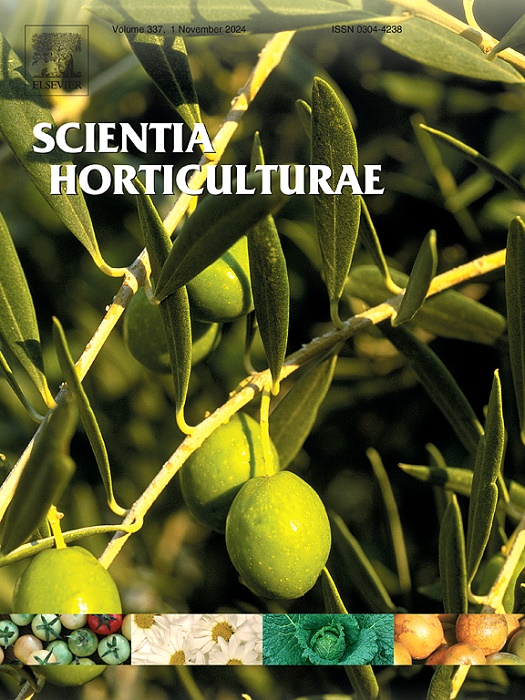一氧化氮熏蒸通过调节活性氧的产生保持哈密瓜果实的品质
IF 4.2
2区 农林科学
Q1 HORTICULTURE
引用次数: 0
摘要
哈密瓜(Cucumis melo L.)是中国西北地区的主要农作物。然而,随着贮藏期的延长,哈密瓜越来越容易出现后熟衰老、品质下降、腐烂等现象,从而严重限制了货架期。在采后贮藏过程中,果实中 ROS 的大量增加会影响哈密瓜的品质。在此,研究了外源氮氧化物熏蒸处理对西周蜜 NO.17 哈密瓜品质的影响,重点关注 ROS 的产生和去除。氮氧化物熏蒸处理有效降低了哈密瓜的腐烂率,抑制了果实失水,更好地保持了果实硬度和相对电导率。在贮藏早期(24 小时内),氮氧化物处理会诱导 O2 和 H2O2 的产生,而在贮藏后期,它们的积累会减少。处理组的 NOX 活性和相关基因的表达量在贮藏初期高于对照组,但在贮藏后期则低于对照组。氮氧化物熏蒸还能提高哈密瓜酶和非酶系统的抗氧化能力,并有助于抑制 ROS 的积累。综上所述,氮氧化物熏蒸可通过 NOX/SOD 系统引发 H2O2 的产生,激活哈密瓜的抗氧化反应,以克服贮藏后期过量 ROS 的产生,从而保持果实的品质。本文章由计算机程序翻译,如有差异,请以英文原文为准。
Nitric oxide fumigation maintains cantaloupe fruit quality by regulating the production of reactive oxygen species
Cantaloupe (Cucumis melo L. ) is a major crop cultivated in Northwest China. However, with the extension of storage periods, cantaloupes are increasingly prone to post-ripening senescence, quality deterioration, rot, and other phenomena, which in turn seriously limit shelf life. During postharvest storage, the quality of cantaloupes is affected by a large increase in ROS in the fruit. Herein, the effects of exogenous NO fumigation treatment on the quality of Xizhoumi NO.17 cantaloupe were investigated, with a focus on ROS generation and removal. NO fumigation treatment effectively reduced the rate of cantaloupe decay, inhibited fruit water loss and better maintained fruit firmness and relative conductivity. NO treatment induced O2 ·– and H2 O2 production during early storage (within 24 h), whereas their accumulation decreased during later storage. NOX activity and expression of related genes in the treatment group were higher than those in the control group during the early storage but lower during later storage. NO fumigation also induced the antioxidant capacity of enzymatic and non-enzymatic systems in cantaloupe and helped to inhibit the accumulation of ROS. Taken together, NO fumigation triggers H2 O2 production via the NOX/SOD system, activating the antioxidant response of cantaloupe to overcome excessive ROS production in the late stage of storage, thus maintaining fruit quality.
求助全文
通过发布文献求助,成功后即可免费获取论文全文。
去求助
来源期刊

Scientia Horticulturae
农林科学-园艺
CiteScore
8.60
自引率
4.70%
发文量
796
审稿时长
47 days
期刊介绍:
Scientia Horticulturae is an international journal publishing research related to horticultural crops. Articles in the journal deal with open or protected production of vegetables, fruits, edible fungi and ornamentals under temperate, subtropical and tropical conditions. Papers in related areas (biochemistry, micropropagation, soil science, plant breeding, plant physiology, phytopathology, etc.) are considered, if they contain information of direct significance to horticulture. Papers on the technical aspects of horticulture (engineering, crop processing, storage, transport etc.) are accepted for publication only if they relate directly to the living product. In the case of plantation crops, those yielding a product that may be used fresh (e.g. tropical vegetables, citrus, bananas, and other fruits) will be considered, while those papers describing the processing of the product (e.g. rubber, tobacco, and quinine) will not. The scope of the journal includes all horticultural crops but does not include speciality crops such as, medicinal crops or forestry crops, such as bamboo. Basic molecular studies without any direct application in horticulture will not be considered for this journal.
 求助内容:
求助内容: 应助结果提醒方式:
应助结果提醒方式:


